Unlocking Your Child's Potential: Fun Brain-Boosting Activities for Every Age
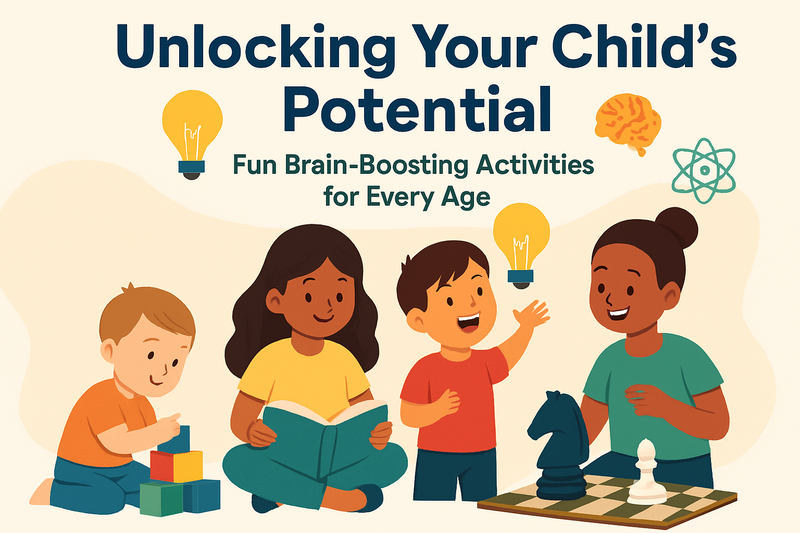
Discover fun, age-appropriate brain-boosting activities that help unlock your child's potential. From simple puzzles for toddlers to creative problem-solving games for school-age kids, enhance cognitive development through play.
The Adventure of a Growing Mind
A child's developing brain is embarking on an incredible journey of discovery, a path paved with wonder, curiosity, and immense potential. Parents and caregivers are the most important guides on this adventure, holding the keys to unlocking a world of learning and growth. This exploration aims to illuminate the fascinating process of brain development and offer a treasure trove of fun, practical, and science-backed activities that can be used to nurture a child's burgeoning abilities at every stage of their development. The early years, in particular, represent a period of profound opportunity, laying the groundwork for a lifetime of learning and well-being. You can explore more about child developmental milestones in our guide. The activities shared are designed to be enjoyable, fostering a positive association with learning, because sustained engagement, which is critical for solidifying neural pathways, is far more likely when children are having fun.
Your Child's Amazing Brain: A Quick Peek Inside
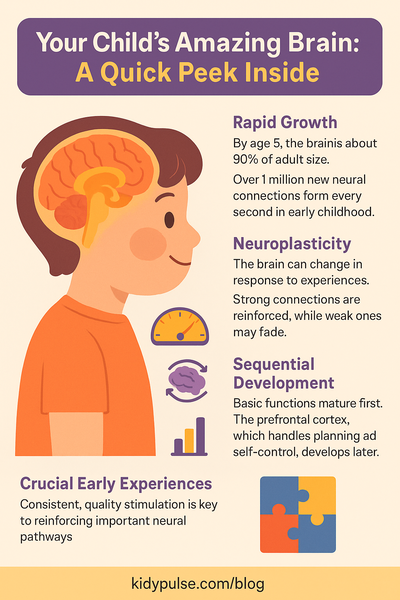
The pace of early brain development is nothing short of astonishing. By the tender age of five, a child's brain has already reached about 90% of its adult size. Consider that an infant's brain doubles in size during the first year of life alone, a period during which it diligently forms over one million new neural connections every single second. These connections are not abstract; they are the tangible pathways that enable everything from a baby's first grasp to their ability to solve complex problems later in life. This rapid growth underscores a critical window of opportunity in early childhood, where experiences significantly shape a child's capacity to learn, think critically, and develop emotional intelligence. For more insights into expert parenting tips for emotional and cognitive growth, see(the best psychological ways to raise a child expert parenting tips for emotional and cognitive growth ).
The brain's remarkable ability to change and adapt in response to experiences is often referred to as neuroplasticity. While genetic blueprints lay an initial foundation, it is the environment and lived experiences that sculpt the intricate architecture of the brain. Connections between brain cells that are frequently stimulated through interaction, exploration, and learning become stronger and more efficient. Conversely, pathways that are seldom used may weaken or be pruned away, a principle often described as "use it or lose it". This dynamic process means that caregivers have a profound and active role in shaping a child's developing brain through the richness of the experiences they provide.
Brain development also unfolds in a generally sequential manner. More fundamental areas of the brain, those responsible for basic bodily functions like breathing and heart rate, mature first. Higher-order functions, such as executive skills like planning, impulse control, and complex decision-making, are governed by the prefrontal cortex, which is one of the last areas to fully mature, continuing its development well into adulthood. Understanding this sequence helps in setting age-appropriate expectations; for instance, the capacity for self-control in a toddler is naturally different from that of a teenager, reflecting these ongoing maturational processes. This sequential growth also implies that robust foundations laid in earlier developmental stages are crucial for supporting more complex skills later on. For example, consistent, responsive caregiving in infancy helps build pathways for emotional regulation, which in turn can support a child's ability to focus and manage stress when they encounter academic challenges in school. The interplay between the rapid formation of neural connections and the "use it or lose it" principle highlights the importance of consistent, varied, and responsive stimulation. It's not merely about the quantity of stimulation, but the quality and consistency that help solidify the most crucial neural pathways for lifelong learning and adaptation.
The Superpower of Play & Connection: More Than Just Fun!
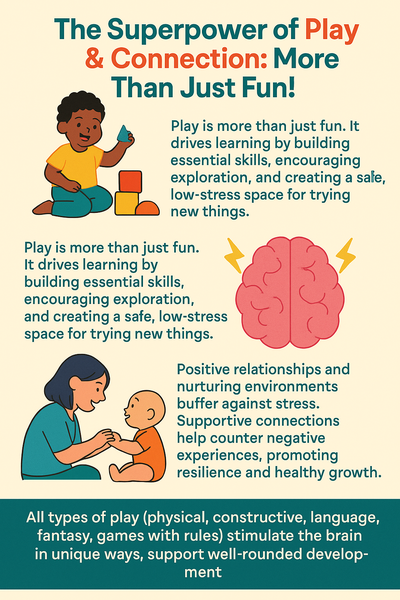
Play is far more than a simple pastime for children; it is a primary engine of learning and development. It is through play that children build and strengthen a vast array of socio-emotional and cognitive skills, experiment with ideas, and make sense of the world around them. When children are at play, they often have control over their actions and feel emotionally safe, allowing them to express themselves freely and try out different behaviors without fear or anxiety. Play allows children to actively use their senses, promoting exploration and nurturing their innate curiosity. Discover the benefits of outdoor play for child development. The very nature of play, particularly its ability to disarm fear, is significant because stress can be a barrier to learning and healthy brain development. Thus, a playful environment inherently supports brain growth by creating a low-stress context for exploration and discovery.
At the heart of early brain development are "serve and return" interactions. These are the back-and-forth exchanges that occur when a baby coos, cries, or smiles (the "serve"), and a caregiver responsively smiles, talks, or picks them up (the "return"). These seemingly simple interactions are profoundly important. Loving relationships with responsive, dependable adults are essential for healthy brain growth, and these reciprocal exchanges build strong emotional bonds. More than just fostering emotional connection, these interactions form the very foundation for skills like motivation, self-regulation, and communication. Each "serve and return" exchange helps build neural pathways for understanding cause and effect (e.g., "When I make a sound, someone responds"), recognizing communication patterns, and learning that their expressions and actions have meaning in the world. This is a fundamental cognitive primer for more complex learning later on. You can also find tips on encouraging positive interactions and social skills.
Positive relationships and a stimulating, nurturing environment do more than just build skills; they also act as crucial buffers against the negative impacts of stress. While positive experiences fuel healthy brain growth, adverse childhood experiences, such as exposure to chronic stress, can disrupt the brain's architecture and affect a child's ability to learn and thrive. However, supportive relationships and enriching environments can help mitigate these effects, fostering resilience and helping children overcome challenges. The different forms play can take—be it physical, constructive, language-based, fantasy, or games with rules —each contribute uniquely to development. Engaging in a variety of play experiences is therefore essential for stimulating different areas of the brain and fostering a wide range of skills, ensuring a more holistic and comprehensive development.
Brain-Boosting Fun for Every Age
Understanding that children develop at their own pace, the following sections offer age-specific activity ideas designed to be fun and supportive of cognitive growth. These suggestions are grounded in developmental principles and aim to empower parents and caregivers to create enriching experiences.
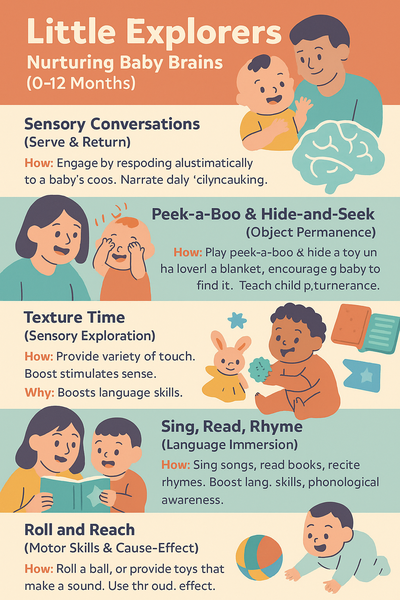
A. Little Explorers: Nurturing Baby Brains (0-12 Months)
This period is marked by rapid sensory development, the acquisition of foundational motor skills like rolling, sitting, and grasping, the emergence of early communication through coos, babbles, and eventually first words, and the critical formation of secure attachments. The infant brain is furiously building foundational connections. The caregiver is the most stimulating and important part of an infant's environment, making direct, responsive interaction paramount. For guidance on selecting toys, check out the ultimate guide to choosing age-appropriate toys for your baby.
- Sensory Conversations (Serve & Return):
- How: Engage by responding enthusiastically to a baby's coos, gurgles, facial expressions, and gestures. Narrate daily activities, describe objects in the baby's view, and maintain warm eye contact.
- Why: This builds crucial "serve and return" neural pathways, fostering early communication skills, strengthening emotional bonds, and teaching the baby that their expressions are valued and have an impact.
- Peek-a-Boo & Hide-and-Seek (Object Permanence):
- How: Play the classic game of peek-a-boo using hands or a soft cloth. Gently hide a favorite toy under a blanket and encourage the baby to find it.
- Why: This activity helps develop object permanence—the understanding that objects continue to exist even when they cannot be seen—which is a significant cognitive milestone. It also reinforces "serve and return" interactions and shared enjoyment.
- Texture Time (Sensory Exploration):
- How: Offer a variety of safe items with different textures for the baby to explore: soft blankets, silky scarves, bumpy balls, or crinkly books. Allow the baby to touch and mouth these items under supervision. As noted, an infant's "fingers want to touch everything".
- Why: This stimulates tactile senses, building neural connections related to touch, object properties, and sensory discrimination. Exploration using all five senses is vital for building these connections.
- Sing, Read, Rhyme (Language Immersion):
- How: Sing lullabies and simple action songs, read colorful board books (especially cloth books with varied textures, flaps, or puppets for babies around 3-6 months), and recite engaging nursery rhymes.
- Why: These activities are powerful boosters for language development, phonological awareness (the ability to hear and manipulate sounds in words), rhythm, and memory. Reading together from the earliest age fosters a love for books and lays the foundation for literacy. Indeed, early literacy begins not with recognizing letters, but with experiencing the sounds, rhythms, and shared joy of language through these interactions.
- Roll and Reach (Motor Skills & Cause-Effect):
- How: Roll a soft ball gently towards the baby, encouraging them to reach for it or, if mobile, to crawl towards it. Provide toys that make a sound when moved or shaken.
- Why: This supports the development of gross motor skills, hand-eye coordination, and an early understanding of cause and effect (e.g., "If I push the ball, it moves," or "If I shake this toy, it makes a noise").
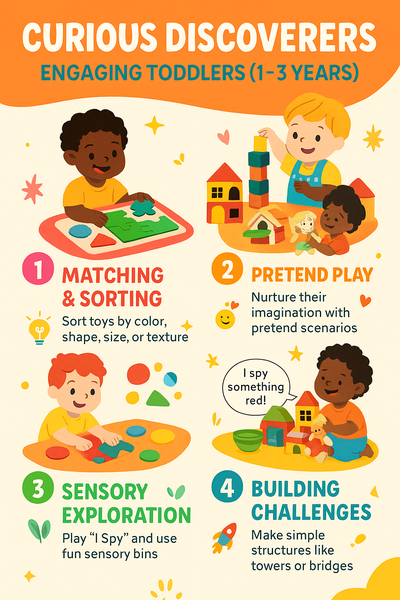
B. Curious Discoverers: Engaging Toddlers (1-3 Years)
The toddler years are characterized by a burgeoning sense of independence, often accompanied by enthusiastic declarations of "me do it!" Language skills explode during this time, motor skills become more refined (walking, running, climbing), and early problem-solving abilities emerge alongside the beginnings of imaginative pretend play. The brain continues its rapid growth trajectory. Activities that allow for choice and self-direction are particularly engaging for toddlers, aligning with their developmental drive for autonomy. Learn how to handle common challenges like transforming toddler tantrums.
- Simple Puzzles & Shape Sorters (Problem Solving & Fine Motor):
- How: Introduce large-knob wooden puzzles, simple jigsaw puzzles with only a few large pieces (2-4 pieces initially), and shape sorters.
- Why: These activities help develop hand-eye coordination, spatial awareness, problem-solving skills, and concentration. They also provide a playful way to learn about different shapes and colors.
- Building Bonanza (Spatial Skills & Creativity):
- How: Offer a set of sturdy blocks, Duplo or Lego pieces, or other age-appropriate construction toys. Encourage stacking, building towers, enclosures, or simple structures.
- Why: Building enhances spatial awareness, problem-solving abilities, creativity, and fine motor skills. It can also be an opportunity to introduce basic concepts like counting blocks or sorting them by size or color.
- Pretend Play Power (Imagination & Social Skills):
- How: Provide props like dolls, stuffed animals, toy kitchens, toolsets, or dress-up clothes. Encourage toddlers to create their own stories and scenarios, perhaps by feeding a doll or "fixing" a toy.
- Why: Pretend play is essential for cognitive and social-emotional development. It helps children understand the world around them, practice social skills like empathy and turn-taking, develop their imagination, and expand their language abilities. Social make-believe play, in particular, is an ideal context for cognitive development and practicing self-regulation. This type of play signifies a major cognitive leap towards symbolic thought, where one object can represent another, a crucial precursor to abstract thinking and literacy.
- "I Spy" & Picture Book Adventures (Language & Observation):
- How: Play simple "I Spy" games focusing on colors ("I spy something blue") or familiar objects. When reading picture books, ask "What's this?" or "Where is the doggy?" encouraging the toddler to point.
- Why: These interactions expand vocabulary, improve listening skills, sharpen observation abilities, and help connect spoken words to visual representations. They also make reading a more interactive and engaging experience.
- Outdoor Exploration & Movement Games (Gross Motor & Sensory):
- How: Take toddlers on nature walks to explore different sights, sounds, and textures. Play simple games like catch, encourage running and kicking a ball, or set up a mini obstacle course with pillows to crawl over or hoops to step into.
- Why: Outdoor play and movement games are vital for developing gross motor skills, balance, and coordination. Nature walks, in particular, provide rich sensory input and foster curiosity and observation skills.
- Sorting & Matching Fun (Early Math & Cognitive Skills):
- How: Gather a collection of toys (e.g., cars, animals, blocks) and encourage the toddler to sort them by color, size, or type. Simple matching activities can include pairing up socks or finding identical pictures in a set.
- Why: Sorting and matching activities help develop cognitive skills such as attention to detail, classification, and comparison, which are foundational concepts for later mathematical understanding.
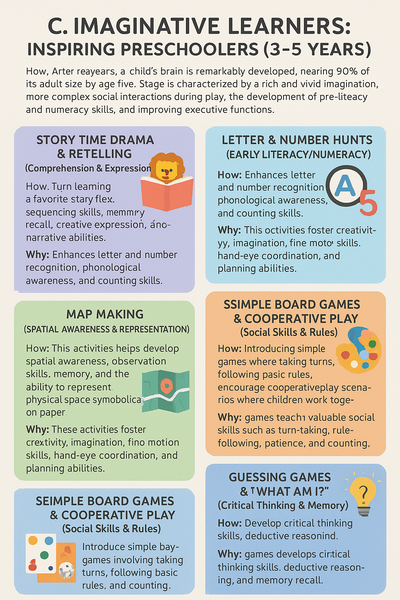
C. Imaginative Learners: Inspiring Preschoolers (3-5 Years)
By the preschool years, a child's brain is remarkably developed, nearing 90% of its adult size by age five. This stage is characterized by a rich and vivid imagination, more complex social interactions during play, the development of pre-literacy and numeracy skills, and improving executive functions such as attention and self-control. Activities that bridge concrete experiences with symbolic representation become particularly important for fostering abstract thought. For more on this stage, see navigating the preschool years: key developmental milestones and explore eco-friendly crafts for kids.
- Story Time Drama & Retelling (Comprehension & Expression):
- How: After reading a favorite story, ask the child to retell what happened at the beginning, in the middle, and at the end. Encourage them to act out different parts of the story, perhaps taking on the roles of characters.
- Why: This activity significantly improves reading comprehension, sequencing skills (understanding the order of events), memory recall, creative expression, and narrative abilities.
- Letter & Number Hunts (Early Literacy/Numeracy):
- How: Turn learning letters and numbers into a game. Go on a "hunt" for specific letters or numbers in books, on signs while out for a walk, or around the house. Practice the sounds that letters make. Count objects during everyday routines, like counting apples at the grocery store or steps on a staircase.
- Why: This playful approach enhances letter and number recognition, phonological awareness (understanding letter sounds), and counting skills, making learning feel like an adventure rather than a chore.
- Map Making (Spatial Awareness & Representation):
- How: Take a walk around the neighborhood, paying attention to and pointing out important landmarks (e.g., the park, a specific tree, a friend's house). When back home, try drawing a simple map of the route taken or the neighborhood. Afterwards, ask the child to draw a map of their own room.
- Why: This activity helps develop spatial awareness, observation skills, memory, and the crucial ability to represent physical space symbolically on paper.
- Creative Construction & Art Projects (Fine Motor & Imagination):
- How: Provide a range of materials for artistic expression and construction: paper, crayons, markers, paint, child-safe scissors, glue, playdough, and more complex building sets. Encourage pattern play with shapes. You can also find 7 expert tips on how to foster creativity in children.
- Why: These activities foster creativity, imagination, fine motor skills, hand-eye coordination, and planning abilities. Engaging in pattern play also introduces early logical thinking and problem-solving.
- Simple Board Games & Cooperative Play (Social Skills & Rules):
- How: Introduce simple board games that involve taking turns, following basic rules, and perhaps a bit of counting (like moving a game piece). Encourage cooperative play scenarios where children work together to build something or achieve a common goal in pretend play.
- Why: Playing simple games teaches valuable social skills such as turn-taking, rule-following, patience, and good sportsmanship. Cooperative play helps develop teamwork and self-regulation skills.
- Guessing Games & "What Am I?" (Critical Thinking & Memory):
- How: Play guessing games where one person thinks of an animal or object and gives clues, or use picture cards where one person describes the picture for others to guess. For example, cut out animal pictures from a magazine, place them face down, and have players ask questions to guess the chosen animal.
- Why: These games are excellent for developing critical thinking skills, deductive reasoning, the ability to ask good questions, and memory recall. The seamless integration of learning into daily routines, such as practicing counting while waiting , makes the discovery process organic and can foster a more positive, intrinsic motivation towards learning.
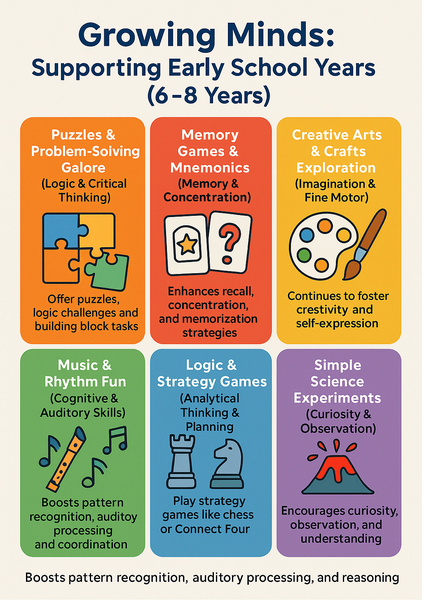
D. Growing Minds: Supporting Early School Years (6-8 Years)
Children in their early school years are developing more logical thinking abilities, have longer attention spans, and show improved memory. Their capacity to understand and follow rules and strategies is growing, and they are formally developing foundational reading and math skills. This stage often marks a growing capacity for metacognition – thinking about one's own thinking and learning processes. Consider how creative activities boost children's mental health.
- Puzzles & Problem-Solving Galore (Logic & Critical Thinking):
- How: Offer jigsaw puzzles with more pieces, introduce kid-friendly Sudoku or other logic puzzles, and present building block challenges (e.g., "Can you build the tallest possible tower using only these 20 blocks?" or "Design a bridge that can hold this toy car.").
- Why: These activities stimulate problem-solving skills, critical thinking, logical reasoning, spatial awareness, and perseverance. Successfully solving a challenging puzzle also boosts confidence.
- Memory Games & Mnemonics (Memory & Concentration):
- How: Play card matching games (Concentration), "What's Missing?" (place several items on a tray, let the child observe, cover the tray, secretly remove one item, then ask the child to identify what's missing). Introduce the concept of mnemonics by creating simple, fun ones together to remember spelling rules or lists of information (e.g., colors of the rainbow).
- Why: These games and techniques enhance concentration, visual and auditory recall, and introduce effective strategies for memorization that can be applied to academic learning.
- Creative Arts & Crafts Exploration (Imagination & Fine Motor):
- How: Provide materials for more detailed drawing, painting, sculpting with clay, or engaging with more complex craft kits. Encourage children to write and illustrate their own short stories or comics.
- Why: These activities continue to stimulate creativity, refine fine motor skills, nurture imagination, and provide avenues for self-expression. Combining story writing with illustration integrates literacy skills with artistic creativity.
- Music & Rhythm Fun (Cognitive & Auditory Skills):
- How: Encourage learning a simple musical instrument (like a recorder or keyboard), singing songs, creating rhythms using household items (pots, pans, shakers), or dancing to different styles of music.
- Why: Musical activities engage multiple areas of the brain, enhancing pattern recognition, auditory processing skills, and language development (especially through rhymes and lyrics). They also improve coordination and stimulate emotional expression.
- Logic & Strategy Games (Analytical Thinking & Planning):
- How: Introduce classic strategy games like chess or checkers (starting with simplified rules if necessary), Connect Four, or other age-appropriate board games that require planning and thinking ahead.
- Why: These games challenge analytical thinking, decision-making skills, the ability to plan ahead, and the flexibility to adapt strategies based on an opponent's moves—all crucial life skills.
- Simple Science Experiments (Curiosity & Observation):
- How: Conduct easy and safe science experiments using common household items, such as the classic baking soda and vinegar volcano, exploring magnetism, dissolving different substances in water, or planting seeds and observing their growth. Encourage nature exploration with a magnifying glass.
- Why: These hands-on activities encourage natural curiosity, develop observation skills, promote problem-solving, and provide a tangible understanding of basic scientific concepts. Even as formal schooling begins, rich oral language experiences, such as reading aloud and discussing stories, remain vital for vocabulary expansion, comprehension, and fostering empathy.
E. Developing Thinkers: Guiding Pre-Teens (9-12 Years)
The pre-teen brain is undergoing significant remodeling, with ongoing pruning of unused neural connections and strengthening of active ones. This period sees the development of more abstract thought, enhanced logical reasoning and problem-solving skills, and a greater capacity to understand different perspectives. Peer relationships also take on increasing importance. Guiding pre-teens through decision-making processes by discussing choices and consequences is a way of actively training the brain in executive functions, scaffolding for the still-developing prefrontal cortex. Explore family mindfulness activities for calmer homes.
- Mindfulness Moments (Focus, Emotional Regulation & Resilience):
- How: Introduce simple mindfulness practices. These can include mindful posing like "The Superman" or "The Wonder Woman" to feel strong and brave; the "Spidey Senses" exercise where they focus intently on what each sense is perceiving in the moment; creating a "Mindful Jar" with glitter and water to visualize how thoughts can swirl when upset and then settle with calmness; or guided mindful breathing exercises.
- Why: Mindfulness practices can help pre-teens build resilience, reduce stress and anxiety, enhance focus and attention, improve self-awareness, and develop better emotional regulation skills. Given the emotional turbulence and brain reorganization common at this age, these tools can be particularly beneficial.
- Complex Puzzles & Brain Teasers (Advanced Problem Solving):
- How: Offer more challenging jigsaw puzzles (500+ pieces), a Rubik's Cube or similar manipulative puzzles, books of logic puzzles or riddles, or age-appropriate online brain training games that focus on strategy and logic.
- Why: These activities sharpen analytical skills, logical deduction, spatial reasoning, pattern recognition, and the ability to sustain attention on complex tasks.
- Debate & Discussion (Critical Thinking & Perspective Taking):
- How: Engage pre-teens in discussions about age-appropriate current events, ethical dilemmas presented in stories or movies, or hold informal family debates on various topics. Encourage them to articulate their viewpoints and listen respectfully to others.
- Why: This develops critical thinking, the ability to construct and articulate logical arguments, active listening skills, and the important capacity to understand and consider different perspectives.
- Creative Writing & Journaling (Self-Expression & Reflection):
- How: Encourage pre-teens to explore creative writing through stories, poetry, or scriptwriting. Suggest keeping a journal to record thoughts, feelings, and experiences, providing prompts if they find it helpful.
- Why: Writing fosters self-expression, creativity, emotional processing, and reflective thinking. Journaling can be a valuable tool for self-understanding and stress management.
- Strategic Board & Video Games (Planning & Decision Making):
- How: Introduce more complex strategy board games that involve long-term planning and resource management. Select age-appropriate video games that emphasize strategy, problem-solving, or creative construction rather than just fast reflexes.
- Why: These types of games can enhance strategic thinking, planning abilities, decision-making skills, and, in the case of many multiplayer games, teamwork and communication.
- Independent Projects & Hobbies (Self-Direction & Skill Building):
- How: Support pre-teens in pursuing a particular hobby or interest in depth, whether it's coding, learning a musical instrument, model building, a specific sport, photography, or another passion. Encourage them to set their own goals and work towards them.
- Why: Engaging in independent projects and hobbies develops self-direction, perseverance, specific skills, and a strong sense of accomplishment and competence. The way pre-teens choose to spend their time is crucial for their brain development.
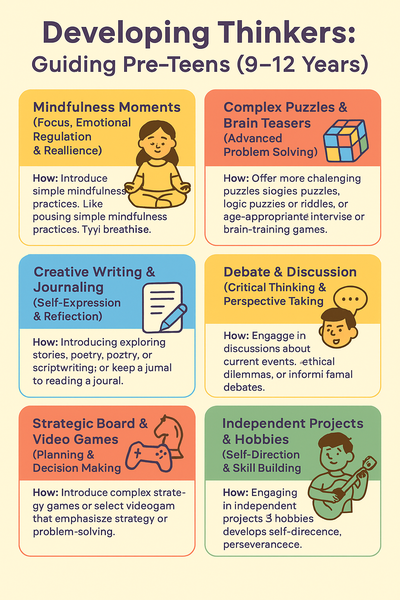
F. Navigating New Horizons: Supporting Teen Brain Development (13-18 Years)
The teenage brain, especially the prefrontal cortex—responsible for vital functions like planning, impulse control, and complex decision-making—continues its maturation process well into the mid-20s. While teenagers are increasingly capable of abstract and complex thought, their still-developing prefrontal cortex means they may sometimes exhibit impulsivity or engage in risk-taking behavior. This isn't necessarily contradictory behavior but rather a hallmark of this particular developmental stage, reflecting the ongoing work in the brain's "control center." The parental role often shifts from direct activity leader to that of a supportive guide and facilitator, mentoring decision-making within the context of the teen's own life experiences. Learn about meaningful conversations with your teen and the importance of sleep for children's health and development.
- Encourage Healthy Risk-Taking & Exploration:
- How: Support their involvement in new and challenging (yet safe) activities such as trying out for a new sports team, joining a debate club, taking on a part-time job, volunteering, or participating in supervised travel opportunities.
- Why: New and appropriately challenging experiences help teenagers develop an independent identity, explore adult roles and responsibilities within safe boundaries, and build new neural pathways associated with these competencies.
- Foster Advanced Problem-Solving & Decision-Making Skills:
- How: Engage in discussions about complex real-world problems, ethical scenarios encountered in news or literature, or future planning related to education, career paths, or personal goals. Encourage them to research options, weigh pros and cons thoroughly, and clearly articulate their reasoning for potential decisions.
- Why: These types of discussions and mental exercises actively strengthen the prefrontal cortex by providing practice in planning, abstract thinking, anticipating consequences, and making reasoned judgments.
- Support Emotional Management & Expression:
- How: Strive to be an open, empathetic, and non-judgmental listener when teenagers want to discuss their feelings. Encourage them to find and use healthy outlets for expressing and managing their emotions, such as participation in sports, creating music or art, writing, or talking to trusted friends or adults.
- Why: The amygdala, the brain region associated with emotions, can be particularly active during adolescence. Providing tools and consistent support for emotional regulation is crucial for their overall well-being and their ability to make thoughtful decisions.
- Promote Good Thinking & Empathy:
- How: Continue to have conversations about feelings—theirs, others', and even characters in books or movies. Discuss different perspectives on issues and the impact that individual actions can have on others. Model empathetic behavior in interactions.
- Why: This reinforces sophisticated social-cognitive skills and helps them navigate the increasingly complex social landscapes of adolescence and young adulthood.
- Prioritize Sleep & Healthy Habits:
- How: Educate teenagers about the critical importance of adequate sleep (typically 8-10 hours per night for this age group) for brain function, learning, memory consolidation, and mood regulation. Encourage regular sleep schedules and establishing a screen-free wind-down period before bed. You might also want to address the screen time dilemma.
- Why: Sleep is vital for overall brain health and optimal cognitive performance, especially during this extended period of significant brain development and academic demands.
- Maintain Open Communication & Connection:
- How: Keep the lines of communication open and inviting. Make an effort to be approachable and consistently available to discuss their concerns, celebrate their successes, and offer support during challenges.
- Why: A strong, positive parent-child connection remains a vital source of support, guidance, and stability as teenagers navigate the complexities of adolescence.
Cultivating a Lifelong Love of Learning: Key Takeaways for Parents
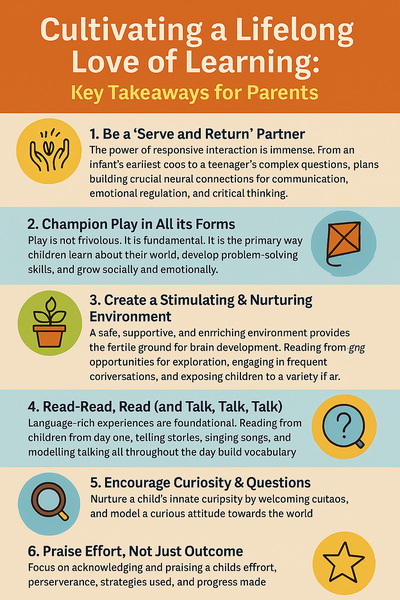
Fostering robust brain development and a genuine love for learning is an ongoing process that extends across all ages. Several overarching principles can guide parents and caregivers in this rewarding endeavor. The common thread woven through all effective strategies, from infancy through adolescence, is the quality of the parent-child relationship and interaction. An engaged, responsive parental presence is arguably the most potent brain-booster available. Consider how adult behavior shapes child development and explore different parenting styles.
- Point 1: Be a "Serve and Return" Partner: The power of responsive interaction is immense. From an infant's earliest coos to a teenager's complex questions, responding attentively and thoughtfully builds crucial neural connections for communication, emotional regulation, and critical thinking.
- Point 2: Champion Play in All Its Forms: Play is not frivolous; it is fundamental. It is the primary way children learn about their world, develop problem-solving skills, and grow socially and emotionally.
- Point 3: Create a Stimulating & Nurturing Environment: A safe, supportive, and enriching environment provides the fertile ground for brain development. This includes offering opportunities for exploration, engaging in frequent conversations, and exposing children to a variety of positive experiences.
- Point 4: Read, Read, Read (and Talk, Talk, Talk): Language-rich experiences are foundational. Reading to children from day one, telling stories, singing songs, and simply talking with them throughout the day builds vocabulary, comprehension, and a love for literacy.
- Point 5: Encourage Curiosity & Questions: Nurture a child's innate curiosity by welcoming their questions, even the endless stream of "why's." Explore answers together and model a curious attitude towards the world.
- Point 6: Model a Growth Mindset & Enthusiasm for Learning: Children often mirror the attitudes of their caregivers. Showing enthusiasm for learning new things and demonstrating a belief that abilities can be developed through dedication and hard work (a growth mindset) can inspire children to embrace challenges and persist in their own learning.
- Point 7: Praise Effort, Not Just Outcome: Focus on acknowledging and praising a child's effort, perseverance, strategies used, and progress made, rather than solely focusing on whether they "got it right" or "won." This approach helps build resilience, a willingness to tackle challenges, and an understanding that learning is a process. For more on this, see our article on positive parenting.
Conclusion: Embracing Your Child's Unique Journey of Potential
Every child embarks on their own unique developmental journey, progressing at their own individual pace. It is important for parents and caregivers to celebrate their child's specific strengths, interests, and milestones, recognizing the individuality of their growth. For more on parenting with purpose, visit our guide.
The brain-boosting activities and strategies discussed are intended to be joyful, shared experiences that strengthen bonds and support healthy development, rather than tools for creating "super babies" or placing undue pressure on children. The profound impact that engaged and loving caregivers have on a child's developing mind is a continuous source of wonder. By embracing the adventure of learning alongside their children, parents can unlock not only their child's potential but also a deeper connection and shared joy in the remarkable process of growing and discovering the world together. The ultimate aim extends beyond cognitive enhancement to encompass the holistic well-being of the child, fostering emotional security, curiosity, and a lifelong love of learning within a supportive and nurturing relationship. For further reading, explore our blog or check our FAQ.
FAQs About Unlocking Your Child's Potential: Fun Brain-Boosting Activities for Every Age
- Question:
How can I boost my child's cognitive development through play? - Answer:
There are plenty of fun, brain-boosting activities you can do to help your child’s cognitive development. For toddlers, simple puzzles and shape-sorting toys can work wonders in enhancing their problem-solving and memory skills. As your child grows, you can introduce games like memory cards, building sets, and board games that promote strategic thinking. Creative activities such as drawing, coloring, or playing with clay also encourage spatial awareness and fine motor skills. The key is to make learning fun and engaging, as this keeps kids interested while developing essential cognitive abilities. - Question:
What age-appropriate brain-boosting activities can I do with my toddler? - Answer:
Toddlers are in the prime stages of cognitive development, so activities that engage their senses and encourage exploration are key. Simple toys like stacking blocks, shape sorters, and interactive books that involve pointing and naming objects are excellent. Singing songs with motions, reading stories aloud, or playing peek-a-boo can also stimulate their memory and language skills. Encouraging imaginative play with toys like dolls, animal figurines, or toy kitchens can help them develop creativity and problem-solving abilities. - Question:
What are some brain-boosting activities for school-age children? - Answer:
As children grow, their brains benefit from more complex activities that challenge their memory, logic, and creativity. Activities like puzzle-solving, Sudoku, chess, and even strategy-based board games are fantastic for developing problem-solving and planning skills. Science experiments, cooking, and learning new skills like photography or coding can also engage their curiosity and cognitive abilities. It's important to vary the activities to target different aspects of their cognitive development. - Question:
How do brain-boosting activities improve my child's memory? - Answer:
Brain-boosting activities are designed to improve various cognitive functions, and memory is a key area they target. Games and activities that require children to remember sequences, details, or patterns—such as memory matching games or storytelling—stimulate the hippocampus, the part of the brain responsible for memory. Engaging your child in these activities regularly strengthens their memory retention skills and helps them recall information more easily.
Sources used in this blog :
Supporting Children's Learning Through Play - ChildCare.gov
Brain development - Be You
Ages and Stages of Development - Child Development (CA Dept of Education)
Brain Development - First Things First
Brain-Building Through Play: Activities for Infants, Toddlers, and ...
Teenage brain development | Raising Children Network
10 Brain Exercises to Boost Your Child's Development
10 Brain-Boosting Activities for 4- and 5-Year-Olds - Day Early ...
Play ideas for baby cognitive development | Raising Children Network
25 Fun Mindfulness Activities for Kids & Teens (+Tips!)
Activities For 2 To 3 Years Old: Engaging And Educational Fun ...
Child Development: Milestones & Stages - Cleveland Clinic
The Benefits of Play in Cognitive Development - Karyn Purvis ...

Comments
No comments yet. Be the first to leave a comment!